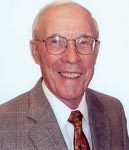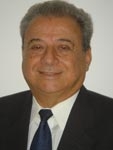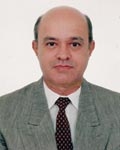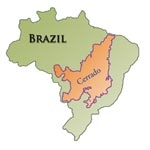Search
June 15, 2006 - 2006 World Food Prize Laureates Announced
Recipients recognized for fostering “one of the great achievements of agricultural sciencein the 20th century”
| |||
|
World Food Prize |
| (WASHINGTON, D.C., USA) – The recipients of the 2006 World Food Prize were announced June 15 at a ceremony at the U.S. State Department featuring Nobel Peace Prize Laureate Dr. Norman E. Borlaug and hosted by the Hon. Josette Sheeran Shiner, Under Secretary of State for Economic, Business, and Agricultural Affairs. World Food Prize Foundation President Ambassador Kenneth M. Quinn announced that the three men who will share the 2006 World Food Prize are: former Brazil Minister of Agriculture H.E. Alysson Paolinelli and former Technical Director of EMBRAPA Cerrado Research Center Mr. Edson Lobato, both of Brazil; and Washington Representative of the IRI Research Institute, Dr. A. Colin McClung of the United States. The $250,000 World Food Prize was established in 1986 by Dr. Borlaug. Celebrating its 20th anniversary this year, it was created to be the foremost international award for achievements that significantly increase the quality, quantity or availability of food in the world. Ambassador Quinn noted that this year marks the first time in its twenty-year history that the World Food Prize will be awarded to three recipients. Lobato and Paolinelli are the first World Food Prize Laureates from Brazil, while McClung is the eleventh Laureate from the United States. Quinn added that the 2006 recipients each played a vital role in transforming the Cerrado – a region of vast, once infertile tropical high plains stretching across Brazil – into highly productive cropland. Though they worked independently of one another, in different decades and in different fields, their collective efforts over the past 50 years have unlocked Brazil’s tremendous potential for food production. Their advancements in soil science and policy leadership made agricultural development possible in the Cerrado, a region named from Portuguese words meaning “closed, inaccessible land.” “This increased agricultural production has helped improve economic and social conditions in Brazil, while their research continues to promote agricultural development and poverty alleviation in other tropical and sub-tropical countries throughout the world,” said Quinn. Quinn noted that from 1970 to 2000 Brazil’s agricultural production more than tripled while its area of cultivated land grew less than 1.5 times. Dr. Borlaug, who is credited with saving more than one billion lives as the Father of the Green Revolution, called the development of the Cerrado “one of the great achievements of agricultural science in the 20th century, which has transformed a wasteland into one of the most productive agricultural areas in the world.” The World Food Prize will be formally presented at a ceremony on October 19, 2006 at the Iowa State Capitol Building in Des Moines. The ceremony will be held as part of the World Food Prize International Symposium, entitled “The Green Revolution Redux: Can We Replicate the Single Greatest Period of Food Production in All Human History?” Follow the links for more information about the Symposium and Laureate Award Ceremony. Laureates’ Achievement Dr. A. Colin McClung’s pioneering soil fertility research in the 1950s analyzed the complexity of Cerrado soils and showed that a transformation of the region was possible. His work uncovered an innovative soil improvement process to correct the drastic nutrient depletion of the Cerrado and counteract aluminum toxicity in the region’s highly acidic soils. Dr. McClung concluded that, with a combination of lime, micronutrients and traditional fertilizer, the Cerrado could be made suitable for production of crops as diverse as coffee, soybeans, citrus and corn. His findings paved the way for agricultural development in the Cerrado in the 1970s under the direction of H.E. Alysson Paolinelli. Beginning his career as Secretary of Agriculture in the state of Minas Gerais in the early 1970s, Paolinelli created a new model for rural credit and other development programs. He envisioned and oversaw the creation of the institutional and financial infrastructure that enabled crop and livestock production to flourish in the Cerrado. His focus on the Cerrado continued as Minister of Agriculture from 1974 to 1979, when he was instrumental in establishing the Brazilian Agricultural Research Corporation (EMBRAPA) to provide a national system of research, technical, and administrative support to farmers and agribusinesses. Paolinelli also provided leadership in establishing the Cerrado Research Center as part of EMBRAPA in 1975. This center’s work, in concert with that of other organizations and businesses, set the stage for the Cerrado’s continued development into an agricultural powerhouse of the 21st century. Mr. Edson Lobato was a leader in evaluating and carrying out studies of Cerrado soil fertility and agricultural production, further expanding upon the work of McClung and Paolinelli. During the course of his 30-year career as an agronomy engineer and administrator at EMBRAPA (1974 to 2004), Lobato led Cerrado soil fertility and agronomy research as it expanded to include soil microbiology, soil management, and crop management. The success of Lobato’s diligence and leadership, coupled with the efforts of his colleagues, allowed for an expansion of agricultural development on the Cerrado. | |






